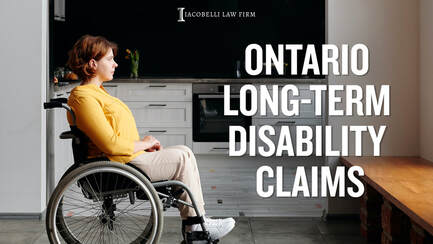 In our recent YouTube video and Podcast, we discuss Ontario long-term disability claims and what your rights are if your Ontario Insurance Company has denied your application for long-term disability benefits. We hope you enjoy this episode and find it informative. As always, if you a question about your own situation, call us day or night for a Free Consultation. What are Ontario Long Term Disability Claims? Andrew: So Ontario long-term disability claims, why don't you talk to us a little bit about what those are and how we get involved in those kinds of cases? Colton: Whenever you are involved in an accident, let's say a motor vehicle accident or a slip and fall injury, and you have long-term disability through work or through another insurance company. You're able to apply to these long-term disability benefits and you get compensated for your time that you miss off of work for that specific injury. Andrew: Client comes to us specifically for a long-term disability claim that's been denied. Colton: Mm-hmm. Andrew: Another scenario would be where we're representing the person in connection with another injury, whether it's from a car accident, slip and fall, or a defective product or whatever it might be. And then it just evolves that they're unable to return to work for an extended period of time. And then an application has to be made for long-term disability as long as the carrier of the insurance companies pays those benefits. Our role is really just to support it . What happens when the insurance company determines a person is no longer eligible for long term disability? Andrew: So what happens though if the insurance company's been paying it for six months or eight months or maybe more, and then they either get the person assessed or they get some new medical records and they make a determination the person's no longer eligible? Colton: We are able to assist in trying to reverse that denial. So we basically, we advocate on your behalf. We obtain clinical notes and records. You know, we might get some expert reports to show the insurance company and to prove to them that you are disabled from working, you know, your employment or any other employment. And we're gonna get to that a bit later just because the test does change, you know, usually after the two year mark. But we try to advocate on your behalf to have ongoing entitlement of benefits or in the alternative long-term disability carriers they much rather prefer to, you know, resolve the claim in its entirety and pay you for five years down the road in total or whatever the time frame is. Andrew: Unlike other areas of law that we practice, long-term disability is, although they're, they're similar oftentimes each one is different. They have different tests, different languages, different quantum, some are taxable benefits, some are non-taxable. So it's really important for us to get a hold of the contract itself and read the language. And then kind of strategize what's the best avenue to prove this case. Right? Because at the end of the day. We're trying to prove that the insurance company is in breach of the policy or in breach of the contract. What are the tests or requirements to be eligible for long term disability claims? Andrew: What are some of the tests that you typically see in long-term disability to be eligible? Colton: Within, let's say the first two years or 104 weeks. The test is you are considered to be disabled if you are completely unable to return back to your own form of employment. So for example, let's say your employment at the time of the accident or at the time of your disability or injury, is a nurse, right? So the test is that you can't go back to working as a nurse within the first two. The test changes to not being able to go back to any form of employment of which you are suitable by way of training, employment, education, et cetera. Andrew: Generally, the test is less restrictive in the first two years and after the two years it becomes more restrictive, harder to meet that test. How does retirement affect long term disability benefits? Andrew: I think I would also say there's things that people could do that would terminate your benefits sooner. Right? So it will, oftentimes these policies are written till age 65 or retirement, whichever is sooner. So sometimes people might make the mistake of retiring. Maybe they're near retirement, they're fighting with their disability carrier not paying, and then they say, well, maybe I can get a pension. Maybe I'll quit this job, or something else. Colton: Or severance package or something. Andrew: Right? But those steps could actually undermine your claim. Could actually eliminate your claim for future benefits. If you are thinking of making a decision like that to quit or to retire early and you have access to a disability plan, even though it's been denied. Speak to a lawyer first because you might be giving up a lot of money. And then I think it's also important to stress that all of these contracts are different. So while we're talking about what we generally see or oftentimes see. It's really important that we look at the contract and see what the specific terms of that policy are. How to get your long term disability benefits restored if they have been denied Andrew: In most cases, do you have to file a lawsuit to get them to restore the benefits? Colton: Yes. 99% of the time we do have to issue this statement of claim, or in other words, file a lawsuit, before the insurance company gets in touch with us. And then we try to you know, explain to 'em the situation, provide them with documentation, medical documentation. You know, if they're of the opinion that you're still not disabled, then we proceed to litigation and go through the normal recourse and normal steps of pushing it forward in the litigation realm. Long term disability claims in connection with personal injury claims Andrew: Now what happens if the long-term disability claim is connected to another injury? So here's an example. A client comes in, they were in a serious car accident. In the beginning they're off work, they're on short-term disability, they use up all of their sick time. And then as time goes on, unfortunately they are unable to return to work and so they also commence a claim for long-term disability. We have this claim going on to recover money because they were injured in a car accident, but now you also have concurrently another claim going on for long-term disability. Colton: Most of the time the insurance company or the lawyer for the motor vehicle accident claim would also want to know what's happening with the long-term disability claim. Just because they do go hand in hand. Let's say long-term disability indicates that you are still unable to return back to work and you're deemed disabled. Actually helps because it actually shows this individual is unable to return back to work because of the motor vehicle accident. Andrew: The acceptance of long-term disability or the success of that claim can lend itself to more success in the other claim. Colton: Mm-hmm. Double Recovery and Long term Disability Claims Andrew: But what about double recovery? Talk a little bit about set offs and how those two relate to the recovery. Colton: So generally speaking, if you do recover let's say future income loss or pass income loss from your long-term disability claim. The motor vehicle accident claim they're allowed a set off for whatever the long-term disability carrier paid you. Because you can't recover the same amount of money from both sides. Even if there is, you know, a setoff. Nonetheless, it does help with the motor vehicle accident claim in itself because it does make it stronger. Andrew: And also if there is no dispute with the long-term disability carrier and you settle with the at-fault party on whether it's a car accident or a slip and fall or something else. You're not paying fees on that amount of money that's being paid by the long-term disability carrier on an ongoing basis. So for instance, as your lawyers we would charge you fees for the work we do in settling let's say the car accident case. But if the long-term disability has accepted you as disabled and is continuing to make those interim payments to you, we're not charging you anything on that. Colton: Mm-hmm. Andrew: So the client gets that money without paying a lawyer. The only time we would collect a fee on that is if it got into litigation. If we had to resolve the case or file a lawsuit or, or something of that nature. Time limitations for filing a lawsuit if your long term disability claim has been denied Colton: It's also important to note that whenever there is a denial from a long-term disability carrier, they would send you a denial email or denial letter listing their reasons for your denial and the date that it's denied on. And this date is very important because there are time limitations and due dates for us to commence a lawsuit within a specified period of time. Andrew: Fatal mistake is, sometimes where a client tries to deal with it on their own and get some supplemental records. And in the meantime, precious time is going by and sometimes if you get to a lawyer late, even if the hard deadline hasn't expired, a lot of lawyers just won't take that case because they don't want the risk of taking on a case without ample period of time to properly investigate it and obtain all the information necessary to file a lawsuit. I think that's a really important point. Do not delay. Get a consultation with an experienced lawyer soon. What are the reasons you may be denied long term disability? Andrew: So some of the reasons that we see where people have been denied long-term disability. From my perspective, very often it's because of a lack of just medical support. Colton: Lack of following doctor's advice for treatment. Because an insurance company, they're of the opinion that if an individual isn't continuing on with their treatment or on doctor's advice. They're not really as injured as they are, or they're not disabled because they're not seeking medical treatment that was referred to them, or recommended to them by their treating family doctor. Andrew: To an insurance company, that's an opportunity because now you don't have treating doctors to say you have this ongoing injury or disability. So the insurance company will use that as an opportunity to kind of supplement with their own opinions. Protect Your Rights: Bringing a claim against an insurance company Andrew: The topic of long-term disability is really specific to your particular policy of insurance. And so it's important if you've been denied or your claim is being delayed or the insurance company's questioning whether to continue paying you or proposing changes to your benefits to seek the advice of a lawyer. Just sit down with a lawyer, have them review your policy. Get advice so you can make an informed decision. And most importantly, protect your rights in the event you have to bring a claim against that insurance company. Have Questions? Contact us today! Colton: If you have any questions, please don't hesitate to reach out to us at any time. Our contact information is listed below. Iacobelli Law Firm realizes how difficult and life-changing it can be for your family when you are disabled from working. We are a dedicated Ontario Personal Injury Law Firm that provides compassionate and competent legal counsel for the injured throughout Ontario and we offer a FREE Consultation so please feel free to call us at 1-866- 234-6093. We are available to take your call 24/7 and are honored to serve our clients and our community. Andrew Iacobelli is an experienced personal injury lawyer who established Iacobelli Law Firm with offices located in Ontario, Canada and Florida, U.S.A. Andrew restricts his practice to the representation of personal injury victims in claims involving serious injuries and wrongful death in Canada and the United States. Andrew is the author of "Are You a Canadian Injured in the United States? Claim the Damages and Insurance Coverage the Right Way".
0 Comments
Your comment will be posted after it is approved.
Leave a Reply. |
Author:
|
- HOME
-
Personal Injury
- Catastrophic Injury >
- Wrongful Death >
- Motor Vehicle Accidents >
- Premises Liability
- Slip and Fall Accidents
- Nursing Home Negligence
- Child and Birth Injuries
- Bouncer Assault Injury
- Medical Malpractice
- Defective Products
- Watercraft and Boating Accidents
- Dog Bites/Animal Attacks
- View All Practice Areas
- Disability Law
- Business Litigation
- Our Team
-
Resources
- Video Gallery
- Media and Speaking Requests
- How a Car Accident Lawyer Can Protect Your Rights
- Frequently Asked Questions >
- Fees
- Do I Have A Case?
- How to Start a Personal Injury Claim
- Personal Injury Claims
- Accident Benefit Forms
- Ontario Spinal Cord Injury Resources
- Ontario Brain Injury Resources
- Support Groups
- Physiotherapy and Chiropractors
- Links
- Contact
- HOME
-
Personal Injury
- Catastrophic Injury >
- Wrongful Death >
- Motor Vehicle Accidents >
- Premises Liability
- Slip and Fall Accidents
- Nursing Home Negligence
- Child and Birth Injuries
- Bouncer Assault Injury
- Medical Malpractice
- Defective Products
- Watercraft and Boating Accidents
- Dog Bites/Animal Attacks
- View All Practice Areas
- Disability Law
- Business Litigation
- Our Team
-
Resources
- Video Gallery
- Media and Speaking Requests
- How a Car Accident Lawyer Can Protect Your Rights
- Frequently Asked Questions >
- Fees
- Do I Have A Case?
- How to Start a Personal Injury Claim
- Personal Injury Claims
- Accident Benefit Forms
- Ontario Spinal Cord Injury Resources
- Ontario Brain Injury Resources
- Support Groups
- Physiotherapy and Chiropractors
- Links
- Contact
|
You are currently visiting our Canada site, to visit our USA site click here.
|
Main Law Office and Mailing Address15 Wertheim Court, Suite 303
Richmond Hill, Ontario L4B 3H7 |
Toronto1200 Bay Street, Suite 202
Toronto, Ontario, M5R 2A5 Vaughan10877 Keele Street
Vaughan, Ontario L6A 0K6 |
FREE CONSULTATION |
Copyright © 2012 - 2024 Iacobelli Law Firm All rights reserved. | 561-625-6133 | 416-900-1070 | Toll Free: 1-877-742-2529
This site uses content and information prepared by AI including technology from Gemini and ChatGPT technology from OpenAI.
You should always consult with a lawyer about specific legal questions you may have.
You should always consult with a lawyer about specific legal questions you may have.
Iacobelli Law Firm represents victims of serious personal injury throughout Ontario Toronto | York Region | Richmond Hill | Aurora | Mississauga | Scarborough | Vaughan | North York | Stouffville | Keswick | Kitchener | Barrie | London | Brampton | Windsor | Markham | Guelph | Oshawa | York Region | Kingston | Markham | Sudbury | Vaughan | Newmarket | King City | Peterborough | King City | Whitby | Sarnia | Orangeville | Niagara Falls



 RSS Feed
RSS Feed






